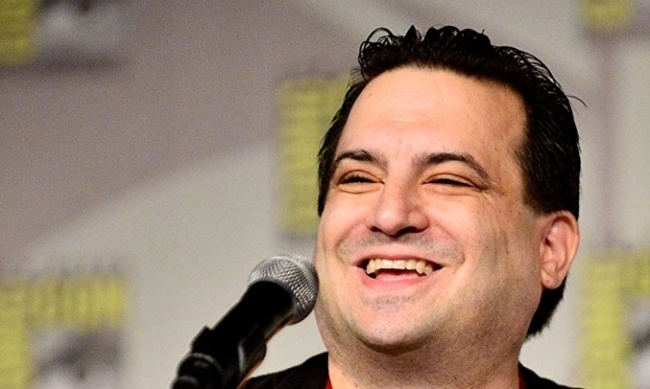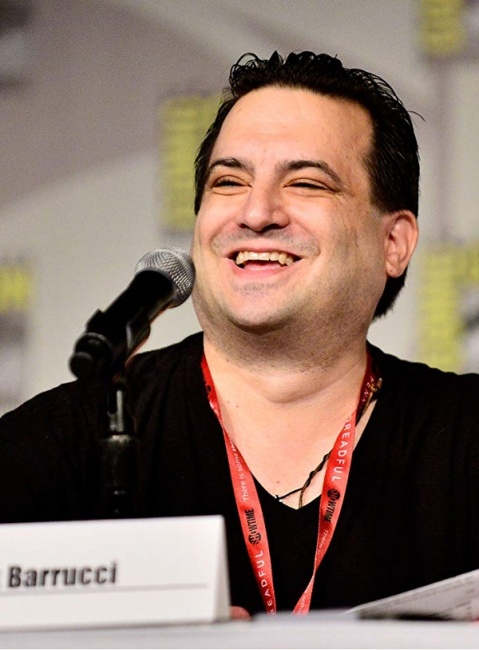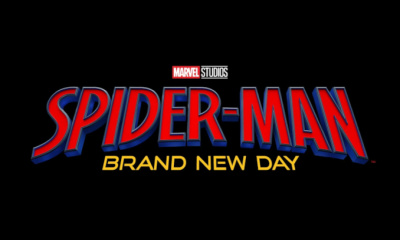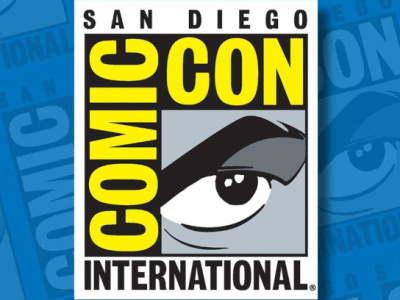This is the keynote address given by Nick Barrucci, founder and CEO of Dynamite Entertainment, at last week’s ComicsPRO Comic Industry Conference, which we share here as a Guest Column.
Good morning fellow comic lovers!
It’s great to see you here. I know it’s not easy leaving the stores during the height of weekly sales, but this gathering is an important enough reason to do so. I’ve always considered the entire industry including you, our retail partners, the creators, fellow publishers and business colleagues as family. We’re family who get together at special occasions, and ComicsPRO is a very special occasion.
We’re all here for the same reason. We love comics and want to do this for a living above and beyond anything else. We’re here to talk, offer and receive feedback and learn at this event.
And fair warning, I'm going to jump around a little bit, and those who know me know that I tend to do so, but trust me, it will all circle back. Plus, I'm Italian, I'm loquacious.
Seriously, I'm hoping that this speech is thought-provoking and gives you more insight to my 37 years in the industry than ever before, but more importantly leaves you with ideas. As I'm here for you! I want to talk about passion, pragmatism, open mindedness, constructive criticism and more. We should all be critical of each other and ourselves, constantly looking to evolve. Constructive criticism can help all of us.
The industry is challenging, but it's not at rock bottom. That was back in 1996 to 1998. The distribution wars and consolidation, the mis-billings and short shipments and Marvel’s bankruptcy. Many retailers closed down, but many of you were there and survived and lived to thrive.
The comic industry has seen more ups and downs than many other industries. I've been in it for 37 years and wouldn't trade it for anything in the world. Practically every decade has had a rise and a fall: the explosion of the early industry with the dawn of superheroes and connection to the war effort; to a slump in those heroes and success of diverse genres in the 1950s and then near extinction thanks to Wertham; DC's superhero resurrection in 1959 and Marvel’s rise from the ashes with Stan, Jack Steve and so many others; then the Implosions of the 70s, and the rise in the 80s with watershed work from Miller, Claremont, Byrne, Wolfman, Perez, Moore, Chaykin, Starlin, while simultaneously we saw the Black and White Indie Boom (and eventual Bust); then the boom of the early 1990s and aforementioned crash. It wasn't until Marvel Knights that the turn was in sight, but at the time you didn't know it was happening.
That climb lasted through the better part of 2014 or so and since then, the industry has been more challenging. We all survive because this industry has more passion than any other and we all work hard together. The fans, retailers, publishers, all of us have passion. We all want to grow the industry. We'll not always do everything perfectly, and we can’t always get along perfectly. But that's OK.
Now... I'd like to talk about my own passion which has led me here, in front of you today! How comics, in many ways, saved and defined me. And I’m not kidding when I say that. I come from an immigrant Italian family, growing up in South Philly and my first language was Italian even though I was born here. I found comics at the candy store, they just blew me away and helped me learn English. As a young kid in the early 1980s, I was buying comics three for a quarter without covers. All I could do is wonder where you could find comics with covers. I guess I'm making up for it now with variant covers at Dynamite.
But then something awesome happened; in the 8th grade my school gave out the Marvel comic about Pope John Paul the 2nd. I couldn't believe it – I finally had a comic with a cover. At that point I quickly found a comic store. I started making money from multiple after school jobs to afford my comics (with covers).
I made new friends at the comic store because it was a haven where I could talk to people about comics, and to get excited for when I would have more money to buy more comics, and this fostered a community in the shop.
There are sliding doors that happen in life. Here's mine. My parents sent me to a private and elite high school, and it sucked. I was the nerd. I read comics. I didn’t like sports. I wore hand-me-down clothes. Oh, and my name was Nicola (not endearing). High School really sucked. But I was able to get through it all with some friends and the comics and heroes I loved: Barry Allen, Matt Murdock, Hal Jordan, Prince Namor and others.
I needed money to help my family, so I started selling my comics. By 13/14 years old, I became a "weekend warrior" selling at comic shows. I started working at Fat Jack’s Comicrypt so I could buy my books at wholesale from Mike (the owner). My passion pushed me. I made some friends there including Vince Letterio who worked for Steve’s Comic Relief. Vince would eventually take me to shows with him. He helped my passion. I would then start hiring people to drive me to shows. By the time I was 15, I was paying for almost all my expenses at school. Though my father wished I would get past reading comics, when I turned 16, he helped me further push my passion by buying a station wagon so I could drive to shows myself.
I stopped for a bit when I went to college. But guess what? I missed comics. My passion was there, so I dropped out and went back full time as a weekend warrior. Then in 1992, at the age of 22, I started Dynamic Forces, selling signed books, and then trading cards, action figures, statues, and so much more.
Then in 2004, DF lost our Marvel license and we had to pivot, so I started Dynamite Entertainment. It wasn't something I was looking to do because as a publisher, in addition to the responsibility to your employees, you have a greater responsibility to the creators, retailers, and the fans, as you're now bringing them monthly entertainment and not collectibles that you space out differently. That's a lot of responsibility. Looking at the history, the industry was littered with comics publishers who didn't make it past 10 years. It was daunting. I did know that if we were going to succeed that we would have to give 110% times 10 to do it right.
This is part of the story that got me here, today, in front of you, with this great honor as Keynote speaker. I've mentioned that there are challenges, and I've mentioned that we all need constructive criticism and ideas. I'm going to say something that may come across as too blunt, but I feel it needs to be said. The overwhelming majority of retailers are communicative and are up for discussions. At times, there is a retail minority that are loud and the equivalent to "keyboard cops," and they may not realize it, but they border on bullying. They prefer cancel culture over discussion and understanding and mutual cooperation.
For the most part, from the retailer, publisher and fan perspectives, this kind of cancel culture as well as resistance to change stifles experimentation and growth. Without experimentation, Marvel's "Heroes Reborn" would not have happened, which would not have led to Marvel Knights, which would not have allowed Joe Quesada to become Marvel Editor-In-Chief, which would not have led to more experimentation like the Ultimate line, Marvel Max, and the many creators that helped usher in another great age of comics.
Many retailers had grave concerns over DC's Black Label with the trim size and price point. But the quality was there and now we have an entire line of best-selling books with Brian Azzarello, Jeff Lemire, Stjepan Šejić and more.
Image rolled the dice and experimented with how they worked with creators and creator-owned properties and were able to bring Jason Aaron and Jason Latour's Southern Bastards, Brian K. Vaughn and Fiona Staples Saga, They also brought great works from Kelly Sue DeConnick, Scott Snyder, Jonathan Hickman, Marjorie Liu, Jeff Lemire, Dustin Nguyen and so many others. ould these books have worked elsewhere? Probably. But being creator-owned allowed fans to feel more connected and I believe orders were higher than they would have been anywhere else, ourselves included.
Cancel Culture for some has also allowed politics and personal views to affect the comics you order or the experience your fans have at your store. We need to be open to everything. We need to service everyone. Let me give you a personal example. When Dynamite was fortunate enough to publish The Boys when DC sold the series to us, there were retailers who did not like "sensitive" content. I had retailers threaten to stop ordering all our titles if we didn't cancel The Boys, but we were passionate about the series and stood firm. That was an early threat of cancel culture.
Retailers will ask what publishers will do to promote comics, advertise, sell them. And the answer is, everything we can. We want you to sell more books. We want to create more comics and work with creators and enjoy what we do.
You are your best sales advocate. Encourage and engage your fans. I ask that you try and spend more time talking about the comics themselves. The storylines, the creators, can Hulk beat Superman? Should Cap or Iron Man lead the Avengers? What do I love about X series with Y creator? Focus on the positives. Life has enough negatives. And guess what? Social media and press and everything you ask for that might sell more comics? You have more control than anyone. You have all the control. By engaging your customers and giving them a great experience every time they come to your store, they will not only spend more money, but they will talk about you to their friends. Their word of mouth is priceless!
You all have different needs. No two retailer problems are exactly alike. There is no clear-cut easy answer to everyone's problems. But working together, we can figure it out. You don't support all publishers equally, and that's OK, so long as we work together. Ben Franklin said, "We must, indeed, all hang together or, most assuredly, we shall all hang separately." We are family. We can argue, but we need to find the middle ground and work together. And that means not always getting 100% of what we want.
There are some hypocrisies and unconstructive criticism in our industry, but I'm not going to specifically point all of those out. That would be as useless as those criticisms themselves. But I feel I have to mention returnability. It’s a big one. Retailers ask for returnability, publishers offered it. You have FOC after the first issue to gauge sales, yet some complain that returnability is a hassle when it's titles you don't personally want to back. I think it would be good for all of us to have this bubble up with some of my talk, here, in a civil manner. Where we all can discuss our reasoned points of view, not emotional ones.
I seem to remember Joe Field may have said this at one point. When sales are good, there are not enough comics coming out, when sales are bad, there are too many comics. But different retailers sell different comics, and there are different audiences. You have the ability to order what you feel you can sell without criticizing everything you can't.
But I'll also point out the positive criticisms and ideas that moved our industry forward, and the need for more. Joe Field suggesting Free Comic Book Day. Brian Hibbs leading to Final Order Cut Off. Tuesday delivery. And burgeoning advancements like Comic Hub from Stu Colson.
And let's not forget older advancements going back decades like Carol Kalish pushing for registers at comic shops. The Star/Tru system at Diamond that allowed for retailers to re-stock more quickly. The direct market itself, which saved this industry and continues to provide strength.
And ComicsPRO! There were many previous attempts to have a retail group, but they all died pretty quickly. But for 15 years, this group continues. That's something to be extremely proud of!
Now to talk about what Dynamite is going to do to help grow both your business and ours. Keep in mind, there's always going to be kayfabe and one-upmanship among publishers, so to my fellow publishers, take it in stride. Two years ago, before anyone else, Dynamite began focusing on our key books and curating our line. We cut our output from as many as 32 comics a month down to around a dozen, and sales on each individual title went up. Big time! We also starkly reduced the variants on certain series such as James Bond and The Boys, while series such as Vampirella and Red Sonja, fans have shown they like collecting a variety and following their favorite artists. We've also cut annuals and specials across the board unless they were important to a story. The better the books, the more sales will come. We have been and will continue to be more judicious in our choices for new releases but will still experiment with new titles and genres.
I brought up returnability earlier, which came out of constructive criticism and we've been a strong advocate of it. For over a year, we’ve had returnability for at least one first issue every month and on select second issues as well. Thanks to constructive criticism from retailer Phil Boyle, in a moment I will tell you about an additional returnability program that I think will make many retailers happy.
I’m sure you’ve all noticed that we’ve created more incentives and FOC exclusives. This has been one of the tradeoffs of a more curated line. Some of you like them, some don't, some could even describe it as love or hate. But I can say they are working and there are those among you who see the value in them and appreciate them. Phil Boyle is not a fan, and as you know, he's not shy. Phil and I may not always agree, but we can have conversations. One of the conversations has led to an idea to give retailers even less risk at FOC. I wanted to make this announcement here at ComicsPRO. Once we finalize everything with Diamond, we'll lay out the plan. I think that those who have been on the fence will be very happy.
Thanks to a recently released Diamond report, Bleeding Cool has calculated "market share per capita" for January 2020. They essentially divide the market share by the number of titles released in a given month. It’s been interesting and cool to see Dynamite outperforming many others by that measure and consistently at #4 after Marvel, DC and Image. For January we were fortunate enough to be #3 behind only Marvel and DC for average title per unit sales to consumers. If you look at Diamond's monthly charts, compare the number of titles that Dynamite releases to the number of titles other publishers release. You'll see how much market share we have per title. Numbers don't lie. We've been releasing on average 13 titles a month. Look, all publishers want to "one-up" each other and present themselves in the best light, but we've proven that our line average is greater than everyone's outside of Marvel, DC and Image. Others talk and spin the numbers but aren't walking the walk as much.
Going back, returnability helped us sell 150,000 copies of Vampirella #1, breaking a record for Dynamite and for the character. Meticulous planning went into that book, getting the perfect creative set up with Christopher Priest and Ergün Gündüz. Launching to coincide with the 50th anniversary and San Diego Comic-Con. Reprinting collections, Magazine Replica Editions and offering the standee at a loss – with bonus exclusives – all to make it more attractive in your stores. We had less than four and a half percent returns on Vampirella. Fans were clearly receptive, so just as with Spider-Man or Batman, we launched a second title in Vengeance of Vampirella. And that too was a great success!
And we're straightforward about this, even if you disagree with our strategies. I would rather have variants and incentives that give you the confidence to order more up front, and have copies on the shelves to sell day and date, then have you sell out, re-order, have fans lose interest, or worse, play the "reprint game." Coincidentally selling out of product, yet new printings shipping on top of the current printing to create heat and at times with other variant covers, artificial interest. It's the same thing, only spun differently.
And please remember, returnability has a cost to publishers as Diamond charges for the extra service they provide. But that's ok, I want you to have more faith in the books we put out. We have faith that our books have an audience, we want to help you to build that audience.
I know that The Boys Omnibus program did well for you for many of you, and I’m sure many of you thought that this was a no brainer for Dynamite. And while the success that we've had makes it seem so, I have to say, it couldn't be further from the truth. There were no guarantees that the show would take off, or that it would lead to more sales. When the initial orders came in for The Boys Omnibus Volume 1, at 3,200 copies, we rolled the dice and printed 15,000. Volume 2 came in at 2,800 but we printed 12,000. Volume 3 came in at 2,200 but we printed 10,000. Instead of printing in China, we negotiated with our printer in Canada to cut the turnaround time for any additional printing from 3-4 months down to 5 weeks. By the end of the year, we had sold 180,000 omnibuses but had to spend an additional $260,000 printing them locally to ensure supply was there. That's a hard number. We could have saved that money as 70% of the orders were online and a good amount of brick and mortar orders would have stayed, but I wanted to thank you for supporting us year-round. But you having the stock to capitalize was more important to us.
Like most of you, I am the sole owner of Dynamite Entertainment. Dynamite is the only Premier publisher (and the largest comics publisher) with an independent owner. I'm an entrepreneur like you, I don't have investors or stocks, no mega-corporate overlord or Hollywood backing. It was a personal financial risk, but I wanted a way to thank you all for supporting us over the years by ensuring you had what you needed when you needed it.
A lot of these moves were risks. 2019 was a year of risks for us. We knew there were moves we wanted to make, and the groundwork was set for us by becoming the first new Premiere Publisher in over a decade in 2018.
Different retailers have different concerns and as I want you to know, we’re always listening! And as a publisher, we’re balancing our approach with the diverse feedback. When you don’t like what we’re doing, you may think we’re not listening, but that’s not the case, everything we do is an incredible balance. We’re always taking notes to inform our decisions moving forward.
Again, be positive. You never know when your interactions will help this industry move forward. I had drinks with Mathias Lewis Wednesday night, who reminded me he used to watch me on TV Shopping and that fostered his love for comics. Now he's one of you, an esteemed ComicsPRO retailer. You have no idea how rewarding that is.
I've been in the comics industry for 37 years and hope to be here 37 more and 'til I die. I want to be here with all of you too. We have passion. We have the inner strength to grow. We have to walk in every day and remember we want to work with everyone and sell to everyone and bring comics to the world.
As I said earlier, there are great words of wisdom and sayings in life for a reason. One of my favorites is this one from George Bernard Shaw, "We don't stop playing because we grow old; we grow old because we stop playing." I’m not ready to stop playing.
I want to leave you with this thought: You are all great! Each and every one of you are heroes, delivering heroes and stories of all types to those that most need it, your customers! You wake up every day, and go to the store, and speak the gospel of comics. You are all entrepreneurs, hard-working and dedicated and enjoying what you do. You are heroes, and we wouldn't be here without you.
Thank you all, and I'll give a thanks to Pope John Paul the 2nd, and to my father, who passed away a bit over a year ago – though he didn't understand my passion, and wished I would do anything else – still supported me in a way only he could. 37 years, it's a good start. For all of us. Thank you!
The opinions expressed in this column are solely those of the writer, and do not necessarily reflect the views of the editorial staff of ICv2.com.

Guest Column by Nick Barrucci
Posted by ICv2 on February 25, 2020 @ 7:36 pm CT
MORE COMICS
Showbiz Round-Up
August 11, 2025
The summer heat is on, and Hollywood news is boiling over. Time for a round-up!
Column by Scott Thorne
August 11, 2025
This week, columnist Scott Thorne notes a new twist in the Diamond Comic Distributors saga and shares his thoughts on the Gen Con releases that will make the biggest impacts.
MORE COLUMNS
Column by Jeffrey Dohm-Sanchez
August 7, 2025
ICv2 Managing Editor Jeffrey Dohm-Sanchez lays out the hotness of Gen Con 2025.
Column by Rob Salkowitz
August 5, 2025
In this week's column by Rob Salkowitz, he looks at the industry's biggest show, held in the midst of some existential issues.








